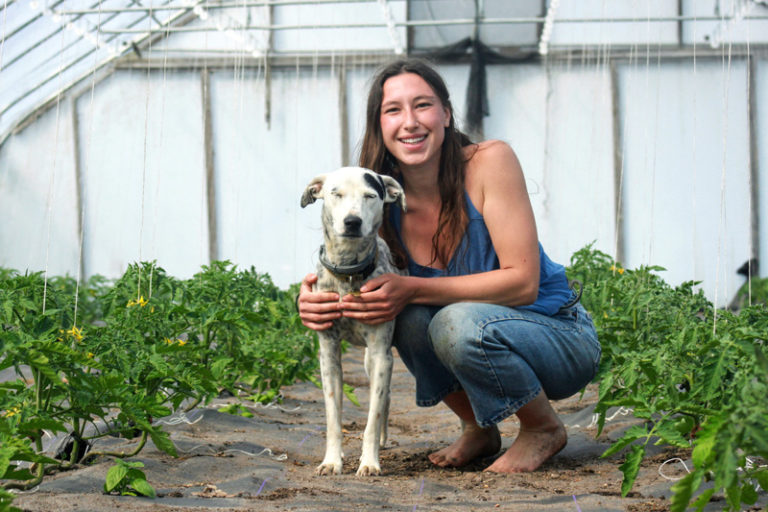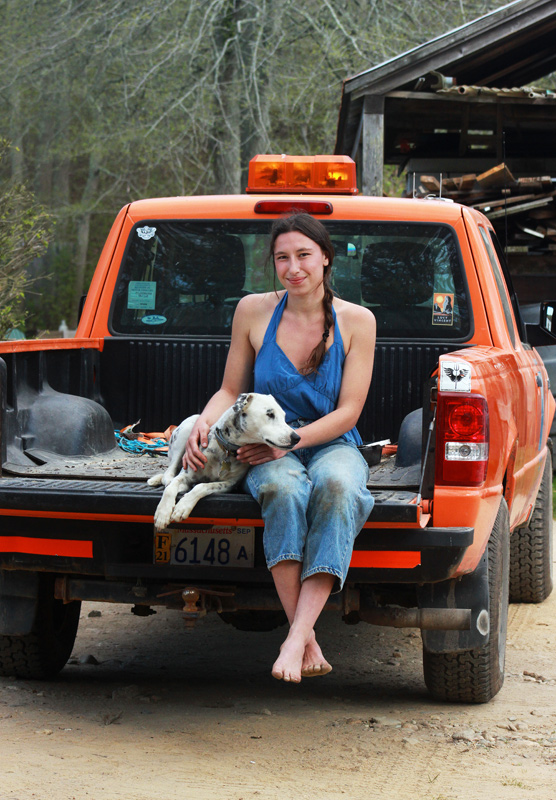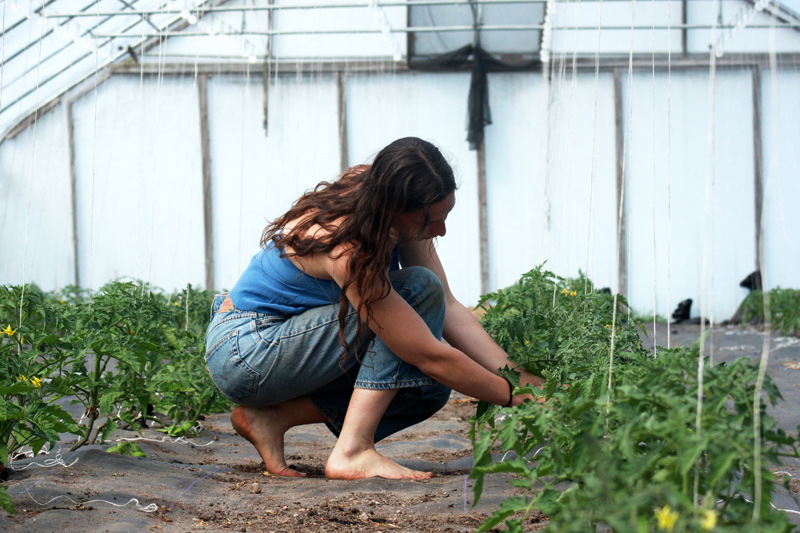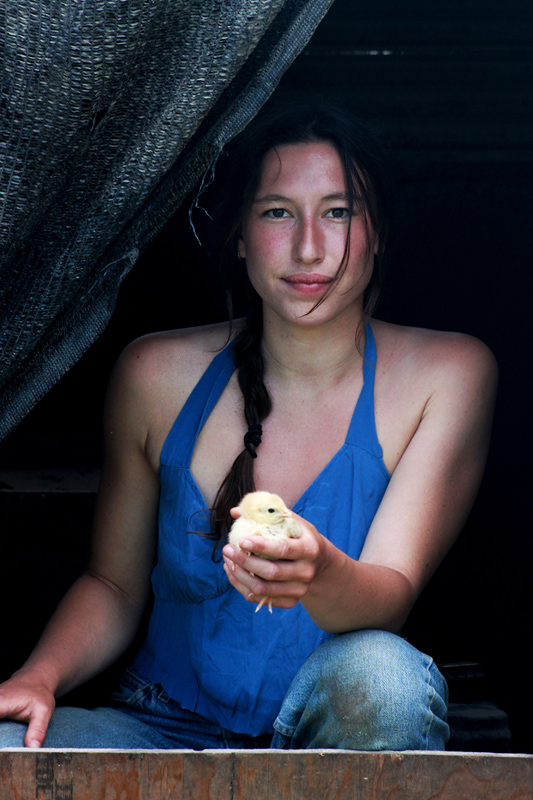
North Tabor Farm, located on North Road in Chilmark, could not embody the spirit and productivity of a small, family-owned and -operated farm more fully. Founded by Rebecca Miller and Matthew Dix, carried on by them and their children, and vigorously supported by the Island community, North Tabor has evolved in every way possible to provide for the Island and thrive under a variety of circumstances and seasonal unknowns.
Rebecca and Matthew’s experience and focus working the land has rubbed off on their middle child, Ruby, who has run with the lessons learned growing up in a farming family. Ruby is managing the farm; 2021 is her second season doing so, and I sat down with her in between spring plantings to talk about her experiences and plans for the farm moving forward.
CF: What are your first memories of the farm?
RD: Walking barefoot at the West Tisbury Farmers Market to get a jam cracker from Ethel, and how much the pebbles hurt my feet. Digging fingerling potatoes from the ground, and my mom telling me they were gold nuggets. My dad paying us a quarter to eat an inchworm.
My parents let my sister and I have our own garden one summer. We planted artichokes, and [I remember] being devastated when we realized we grew Jerusalem artichokes (basically ugly tubers) instead.
Climbing in flower buckets filled with water and pretending I was in the bathtub. Mud. A lot of mud, and finding frogs in our tiny pond, and picking off their leeches.

Describe what it felt like when you went away to school and brought your friends back to your home and farm.
My sister was first to decide to go to boarding school off-Island, and as a typical little sister, I followed her when I got to high school. We went to a small, progressive, artsy high school, and I made a core group of friends who, except for last year, still come to the Vineyard in the summer for the Fourth of July. My friends from high school grew up in cities, so coming to the farm on the Vineyard for the first time, they had lots of firsts. The first time we all camped outside in the field, and one of my friends snuck into my house and slept in my bed instead. My parents let me have friends come to visit, and I mean like 10 teenagers at a time, but the rule was we couldn’t be inside the house, so we had to cook and sleep outside.
What was the decision like for you to take on such a big role on your family’s farm? How did you go about making that decision, and how did the transition into more responsibility happen?
I had been splitting my time between working on the farm and working in restaurants during my summer vacations. I realized how much I loved being outside, and never wanted to stop farming early to work in a restaurant. I was excited to wake up early and work all day, and realizing not everyone is that lucky to love their job made me want to have a bigger role on the farm. My parents needed someone to manage the farm because my dad has always had another full-time job, and my mom had recently started working at the Misty Meadows Community horse center. Me taking on the manager’s role made it easier for them to have involvement in the day-to-day on the farm. Because we are family, I think my investment in the farm as the manager is deeper than a job. This is my home.
The first two summers were hard for me, because it was hard to balance the sales and admin work of the farm and to manage the crew. Now that my mom is back on the farm full-time, it allowed me to be more present as a manager out in the field, and not stuck in the barn writing invoices or delivering.

What is your favorite thing to grow?
Watermelon, because it is always a guessing game to tell when they are ripe. And the best way to know if they are ripe is to have lots of taste tests. When I was younger, we grew a lot more salad greens, and didn’t have the space for melons. Now I have the space to grow them. It feels like a special treat to have a melon patch.
Describe for me the soil at the farm, and how you decide your crop rotations
Our soil is heavy clay, and has a lot of weed seeds because we use horse manure as compost. Our soil holds water well, but it tends to crack as it dries out, which can be a challenge for the direct seeding of some crops. It is hard to rotate crops when it comes to our salad field, because it is intensively seeded. Therefore, we are lucky to have minimal weeds, and if we rotated the salad greens, we would most likely encounter a lot of weeds, making it impossible to use our salad harvester. As we have been learning more about how to care for our soil, we have been trying not to till the fields as much, and use a method called solarization. After we are done harvesting a crop, we cover it in a thick, see-through plastic layer, and the sun shines through and kills the plants and weeds beneath it. For our vegetable crops, we try to change their location each year, because if you don’t switch it up, you risk having the same bug problems on the crop.

What skills have your parents taught you about farming that are unique to each of them? In other words, in what categories do your parents thrive when it comes to farming, and how do these skills complement one another?
When you are the leader, I realized, a lot of the work is building trusting relationships and a healthy dynamic within your crew. My mom is very good at discovering people’s gifts and lifting them up. When your farmers believe in themselves, they become loyal to the farm and you, which creates a successful season. She is also good at establishing relationships with our customers, and incorporating their feedback.
Farming is a dynamic process, and you are constantly trying to foresee nature’s next move and adapt to changes daily. My dad believes there is no one way of doing things, and is continually trying out new things on the farm. Over the years, I have become a better problem solver, and no longer have to call him every time something breaks down, but instead find myself thinking, OK, how would he jerry-rig this?
The three of us have coffee every morning together in the summer as an unofficial farm meeting. We are often not on the same page when we meet at breakfast, but we discuss our different opinions on things and find a compromise. My mom channels her energy into understanding our customers’ wants, whereas my dad prioritizes how to grow food in a holistic but efficient way. And my role is to bring in the reality of what my crew realistically can get done on the farm that day.
Do you consider yourself a teacher?
I do now; I definitely didn’t think I was in the beginning. The first season I was manager, I was 18, and two of my crew members were in their 30s; I was insecure about being a leader because I didn’t think they would see me as more experienced than them. Last summer, I realized I have been farming on the crew for 10 years. Each summer, I show people how we farm, and as I get more comfortable being a leader, I get better at teaching people.
I think one of the most important things they’ve taught me is as farmers, it is our responsibility to support other farmers, especially when you live in an isolated community. This means to lend out your equipment; if you’re taking a truck off-Island, let other farmers know, and you should probably bring two hammers to the farmers market because somebody will have always forgotten theirs.